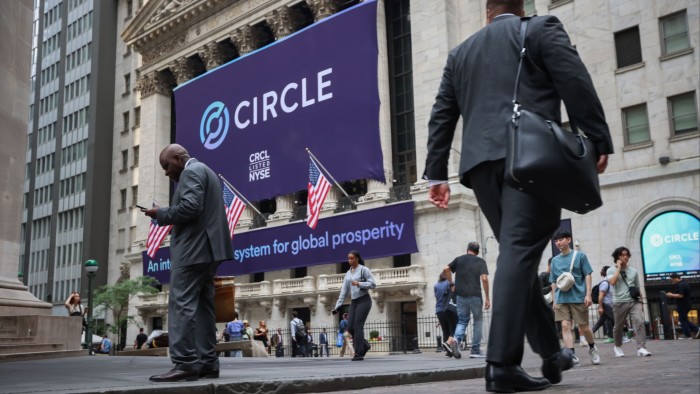Stay informed with free updates
Simply sign up to the Financial services myFT Digest — delivered directly to your inbox.
Cryptocurrency companies are racing to expand into traditional banking in the US, as they seek to capitalise on a friendlier regulatory environment under President Donald Trump and become more embedded in the financial system.
Crypto payments group Ripple, stablecoin company Circle and custodian BitGo have applied for national trust bank charters that will allow them to offer some banking services, while crypto exchange Kraken plans to launch bank cards in the next month.
“It’s a natural convergence,” Arjun Sethi, co-chief executive of Kraken, told the Financial Times, adding the company plans to launch debit and credit cards by roughly the end of the month.
The moves underscore how crypto companies are seeking to broaden their activities from just offering digital asset services. Executives’ confidence has soared because of the Trump White House’s openness to digital assets, whereas his predecessor Joe Biden was perceived to be hostile to the industry.
New-York based Circle said gaining a national bank trust charter from the Office of the Comptroller of the Currency, which regulates financial institutions, would be “a meaningful step” in the integration of digital assets into the broader financial system. Anchorage Digital is the only crypto company with a national bank charter.
“It’s . . . a 180 from where a lot of these crypto companies started, saying ‘we don’t need banks, we don’t need laws, we’re above it all’,” said Max Bonici, partner at law firm Davis Wright Tremaine. “Now they’re saying ‘regulate us’.”
While national trust banks can custody assets and process payments, they cannot provide loans or take direct deposits from customers. Gaining national trust status would remove the need for a company to get licences from individual states and improve its access to the financial system.
The push into banking comes ahead of stablecoin legislation being debated in Washington that would bring the tokens, which proponents argue can act like a currency, closer to the traditional financial system.
“It really does open up the US financial markets to basically allow for stablecoins,” said Adam Chernichaw, partner at Pillsbury.
Stablecoins track the price of national currencies such as the dollar, and are becoming increasingly mainstream, enjoying enthusiastic backing from Trump and his cabinet. Traders use them to move between sovereign currencies and crypto, while others use them for cross-border payments.
The proposed Genius Act will tighten regulation of stablecoins and tie them more closely to US Treasuries, which are used to back stablecoins that are pegged to the dollar. Only regulated banks and some non-bank groups with licences from the OCC will be able to issue stablecoins.
Brad Garlinghouse, chief executive of Ripple, said the company also applied for a master account at the Federal Reserve, which would allow it to hold stablecoin reserves directly with the central bank.
Digital banking and crypto are growing closer, with fintechs increasingly seeking to tap into fast-growing crypto assets to gain US customers.

Retail brokerage Robinhood, which last year derived more than half of its transaction revenues from crypto, is planning to roll out some banking services in the autumn.
“We should be able to help you with all of your financial needs,” Vlad Tenev, chief executive, told the Financial Times. “So your taxes, your estate planning, you don’t have to worry about moving money.”
London-based neobank Revolut — which also makes a large chunk of its revenue from crypto trading — has a long-term ambition to secure a US banking licence, while Klarna chief executive Sebastian Siemiatkowski plans to turn the consumer lender into a crypto company.
Meanwhile, large banks including Bank of America are seeking to issue their own stablecoins once US regulation is finalised.
“This administration has indicated that they’d be open to charter applications in a way that the prior administration was not,” said David Portilla, a partner at Davis Polk specialising in financial services.
But not all crypto companies diversifying into traditional consumer banking see the need to apply for a banking licence. Crypto exchange Kraken — which has a licence in Wyoming — is launching its new app without applying for a charter or master trust.
“We don’t want to be the bank that offers a mortgage. We want to just partner with the best folks that can provide them,” said Sethi.
Source link









